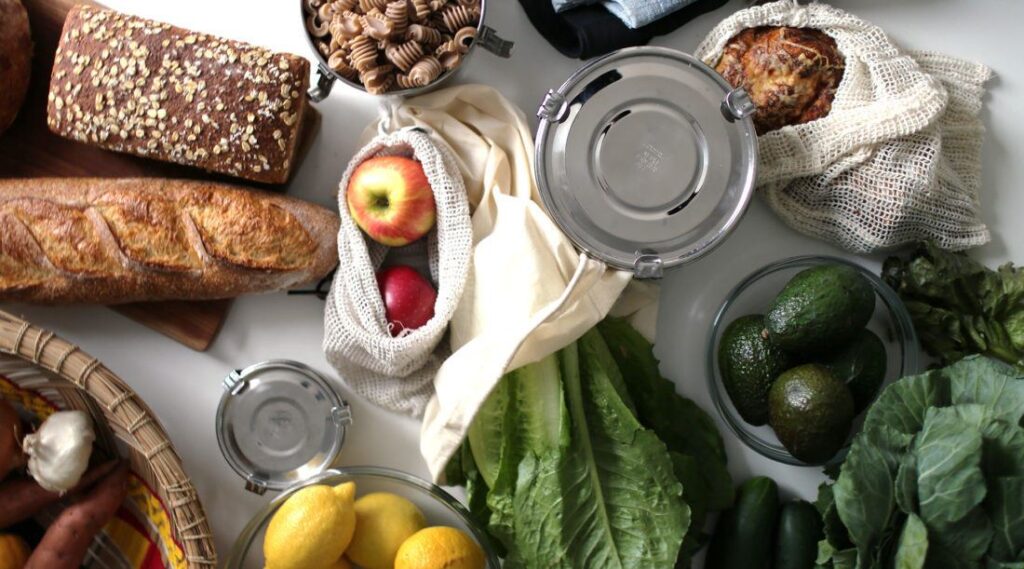It's time to Break Up With Plastic Bottles
- One million water bottles are purchased per minute worldwide, according to United Nations data.
- Bottled water is more expensive and less healthy than tap water because it’s often contaminated with plastic particles.
- Here are some ways to filter your water from home so you can wean yourself off the bottle once and for all.

You’ve probably heard the saying: Bottled water companies don’t make water; they make plastic bottles.
Some of the worst plastic polluters on the planet are in the business of bottled water. The Coca-Cola Company is behind “vapor-distilled,” electrolyte-spiked SmartWater and PepsiCo behind Aquafina. These companies charge upwards of $0.50 per gallon for a renewable resource widely available in the U.S. for $0.02 per gallon. And they justify the markup with words like “unspoiled” and “spring.”
Bottled water, by the way, is practically unregulated by the Food and Drug Administration. Despite the icy mountains and crisp springs often seen on bottle labels, the water inside is simply regular old tap water with mineral modifications.2 The benefits of altering it are counteracted by the fact that 93% contains plastic particles.3
Due to the privatization of water and the “greenwashing” on the part of bottled water corporations, there’s been a shift away from tap water and public drinking fountains. In the United States, the growing reliance on bottled water has led to poor infrastructure investment, inadequate pollution management, and corporate control over a natural resource4 that having access to is a fundamental human right. These challenges have led to a general distrust of tap water. Despite this, most municipal water in the U.S. is incredibly safe, high quality, and heavily regulated.
Perhaps it’s time to break up with plastic bottles for good. Here are four ways to filter your home water from noncommittal charcoal sticks to high-tech installations.
Is Your Water Safe to Drink?
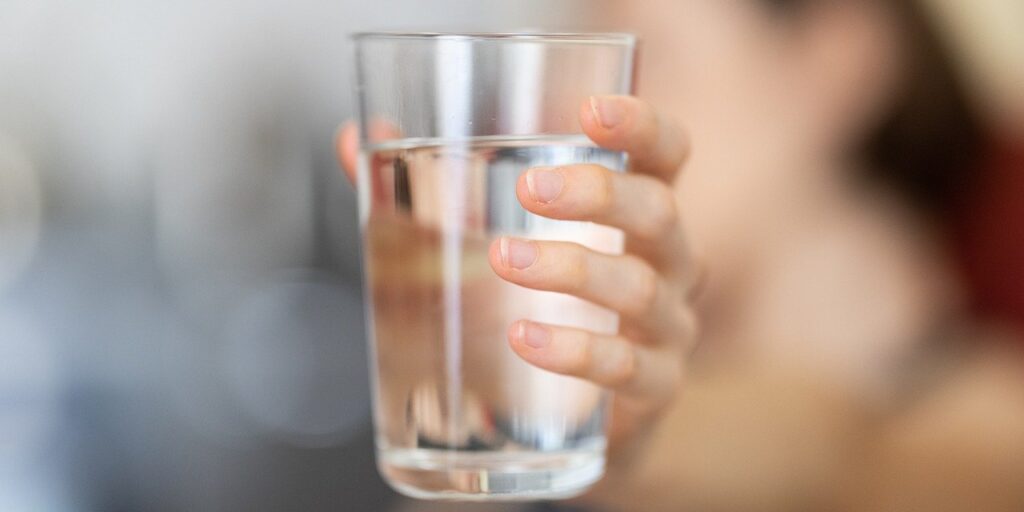
The first step in breaking up with plastic bottles should be testing your tap water for contaminants. FilterWater.com has about 50 drinking water tests to choose from, including special kits for city water and well water. These kits can detect levels of bacteria, lead, pesticides, copper, iron, nitrates, nitrites, chlorine, and hardiness that could make your water unsafe to drink.
Sample tests can be conducted with easy color matching test strips or can be as sophisticated as using a photometer or sending samples into a lab. Once you identify contaminants in your water, you’ll be able to choose the right water filtration method, if any are needed at all.
Method 1: Charcoal
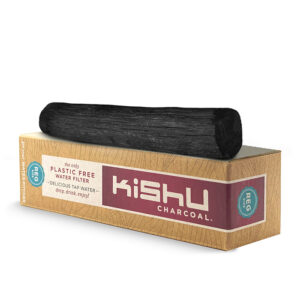
The simplest and potentially cheapest way to filter water is with an old-school charcoal brick or stick. Activated charcoal—i.e., charcoal that’s been heated or somehow treated to make it more porous—has adsorption properties that cause impurities in water to bind to the charcoal, therefore preventing you from ingesting them.
Not only is this an expensive and portable option, but it can also be totally plastic-free. Kishu makes an NSF International-certified charcoal stick that claims to trap heavy metals like lead, mercury, copper, and more. Just stick it in your reusable water bottle and go.
Kishu also makes a charcoal stick for pets. Once it’s reached the end of its life, it can be composted or used (conveniently) as a refrigerator air filter.
Method 2: Countertop Filtration
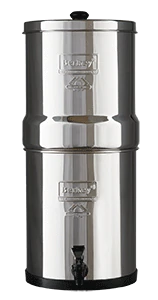 Countertop water filters work like traditional refillable water coolers, but they filter the water themselves and they’re plastic-free. Berkey Filters offers a range of stainless-steel options in various sizes from 1.5 to six gallons.
Countertop water filters work like traditional refillable water coolers, but they filter the water themselves and they’re plastic-free. Berkey Filters offers a range of stainless-steel options in various sizes from 1.5 to six gallons.
Each container stores filters in its top chamber that use a combination of adsorption and ion exchange to remove more than 200 contaminants, including 99.9% of viruses and bacteria, most heavy metals, pesticides, VOCs, and more. Each filter has a lifespan of 3,000 gallons. The container itself is designed to last forever.
Method 3: Faucet-Mounted
Faucet-mounted filters allow you to drink straight from the tap without having to install an advanced filtration system. Unlike with charcoal sticks and countertop containers, faucet-mounted filters also allow you to change the temperature of the water with the knobs on your sink.
The Advanced Faucet Water Filter System by Watens uses activated carbon (like a charcoal stick) to block contaminants like bacteria, chlorine, dust, and sand. It features a speedy water flow of .5 gallons per minute and lasts 320 gallons (or about six months) before it needs changing. Similar products are made by Pur and Brita.
Method 4: Under-Sink Water Filter
Under-sink water filters are the most sophisticated and efficient option. As their name suggests, they’re installed underneath the sink and filter water before it reaches your faucet, so you can use the tap normally for drinking or cooking.
Under-sink filters vary greatly in how advanced they are. You could create a simple DIY version that filters only chlorine or hire a company to install a high-tech system that catches the tiniest of bacteria, such as cryptosporidium (“crypto”). These filters can use different methods to capture contaminates, too, including activated carbon, ultrafiltration—using pressure to force water through a semipermeable membrane—and reverse osmosis.
Reverse osmosis is the most effective at purifying water, not just filtering it. (Filtering water involves removing impurities whereas purification goes a step further to kill biological contaminants and remove minerals from the water.) The downside of reverse osmosis is that it takes longer, wastes more water, and tends to remove healthy minerals along with the bad.
Filtration Not an Option? Switch to Aluminum or Glass Bottles
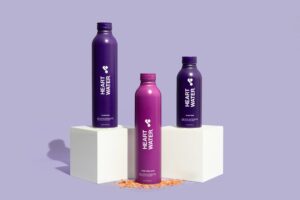
For when buying bottled water is unavoidable, companies like Heart Water make it possible to do so without fueling plastic pollution. Heart Water captures rainwater on its way to the ground, subjects it to a seven-step purification process, and bottles it in recyclable aluminum bottles. It claims to be able to fill a staggering 450,000 bottles with just one inch of sustained rainfall.
The brand even donates 23% of profits to the Heart Water Foundation, a 501(c) nonprofit that provides clean drinking water to water-challenged communities around the world.
Featured Water Filtration Products:
- FilterWater.com drinking water test kits
- Kishu charcoal water filter stick
- Kishu charcoal water bowl filter for pets
- Berkey countertop water filter systems
- Advanced faucet water filter system by Watens
- Pur faucet filtration systems
- Brita faucet filtration systems
- Heart Water aluminum-bottled water
Sources:
- “Our Planet Is Choking on Plastic.” United Nations Environment Programme.
- “Bottled Water: Questions and Answers.” Minnesota Department of Health.
- Mason, Sherri A., Victoria G. Welch, and Joseph Neratko. “Synthetic Polymer Contamination in Bottled Water.” Frontiers in Chemistry. 2018.
- Lisa Kaas Boyle, Esq. and Evelyn Wendel. Tulane Institute on Water Resources Law & Policy; “Public Drinking Water Policy on Tap at the Fountain Near You”

